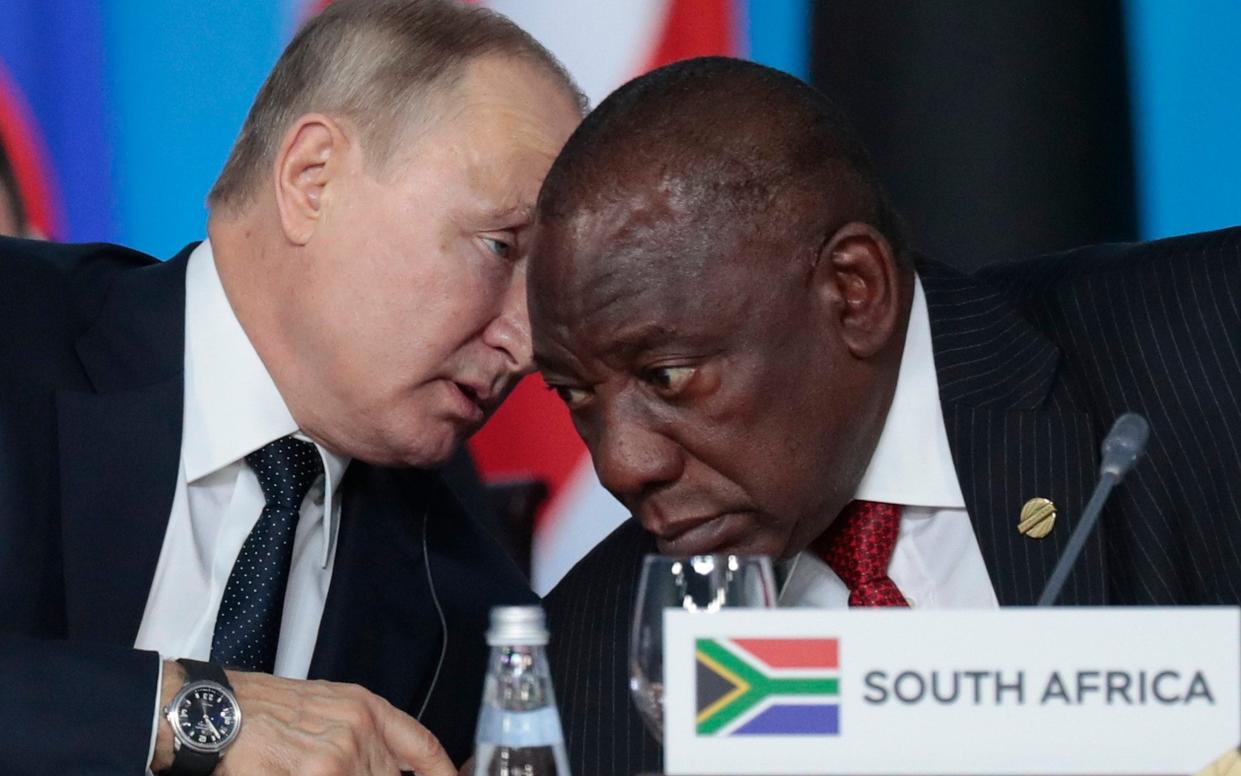South Africa to dodge calls for Putin’s arrest by moving summit

Senior South African government figures are urging Pretoria to move an upcoming Brics summit to China, so the country can avoid the dilemma of whether to arrest Vladimir Putin for war crimes, The Telegraph understands.
Leading African National Congress (ANC) politicians want President Cyril Ramaphosa to skip hosting the Russian leader, amid fears that the country’s stance over war in Ukraine is harming its economy.
On Monday, the government said it was granting diplomatic immunity to attendees, but denied it was deliberately shielding Putin, who faces an arrest warrant from the International Criminal Court.
Pressure mounted as the opposition Democratic Alliance party launched court action to compel South Africa to act on the warrant if he sets foot in the country.
South Africa’s refusal to condemn Moscow’s invasion of Ukraine and its hosting of war games with China and Russia have long frustrated the West. Tensions increased sharply earlier this month when the US ambassador accused South Africa of shipping arms to Russia last year.
Leaders of the Brics (Brazil, Russia, India, China and South Africa) bloc of nations are due to meet in South Africa in August for a summit that Pretoria sees as a cornerstone of its foreign policy. But the arrival of Putin would leave the country facing a choice of whether to abide by international law and arrest the leader of a powerful nuclear-armed ally, or become a pariah among its Western trading partners.
South Africa’s central bank this week warned that any falling-out with the US risked damaging the country’s financial sector.
A senior government insider told The Telegraph: “We are hoping the president will listen to all this concern and will approach China.
“We are suffering from this whole Russian matter. It is worrying to many people including some in senior positions in the government.”
Pretoria says it is charting a neutral course in the Ukraine war and refuses to be pressured by Europe or America. Many of the ANC old guard also claim solidarity with Moscow because the USSR supported their struggle against apartheid.
The country has repeatedly hosted Sergey Lavrov, the Kremlin’s top diplomat, and he is expected in Cape Town again later this week.
But Western diplomats have become increasingly concerned that some in the government are leaning heavily towards Moscow. Earlier this month, Reuben Brigety, the US ambassador, alleged that a sanctioned Russian freighter picked up a consignment of arms from South Africa in December.
The rand tumbled in the days after the allegation despite South African denials. Mr Ramaphosa has now launched a judge-led inquiry into the accusations.
The previous Brics summit in June last year was held virtually in China, meaning Mr Ramaphosa did not attend in person. Pretoria is also thought to be investigating whether Putin could attend in August remotely, avoiding a confrontation.
Moscow has already declared that it would consider any attempt to arrest Putin on foreign soil as an act of war.
John Steenhuisen, leader of the Democratic Alliance, is seeking a court ruling that the government would be breaking the law if it failed to arrest Putin.
His court petition argues the country is “duty-bound in terms of the Rome Statute and the Implementation Act to arrest President Putin upon his arrival in South Africa”.
The government said issuing immunities to those attending the August summit was a formality.
Clayson Monyela, spokesman for the department of international relations and cooperation, DIRCO, said: “issuing immunities happens every time we host an International conference or summit.”
He said the latest immunities were for foreign ministers from Brics countries who are meeting at the end of the week in Cape Town, and for the Brics summit in South Africa in August. “Gazetting of these immunities was routine.”

 Yahoo News
Yahoo News 
